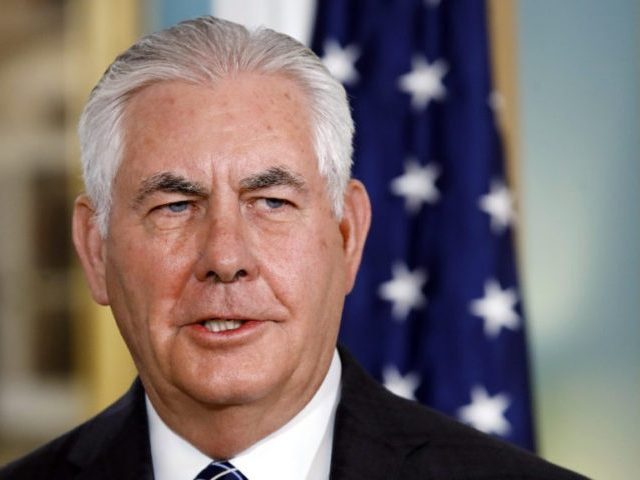As Chinese President Xi Jinping worked to consolidate power at the Communist Party Congress in Beijing, U.S. Secretary of State Rex Tillerson was unloading on the Chinese in an address to the Center for Strategic and International Studies in Washington on Wednesday.
Tillerson’s speech comes as a welcome response to the aggressive global agenda laid out by Xi, but it is also surprisingly tough given how hard the Trump administration has worked to get China on board with restraining North Korea.
Tillerson, who usually plays the “good cop” counterpart to Trump’s fiery criticism of global adversaries, was unsparing in his criticism of China’s business practices. The topic of his speech was “Defining Our Relationship with India for the Next Century.” He segued into hammering China during the Q&A session, after praising India’s economic development and efforts against terrorism in glowing terms for a good twenty minutes.
CSIS President John J. Hamre teed up the assault by quoting a “very interesting” passage from Tillerson’s remarks on India, in which he called for a close U.S.-Indian partnership to “ensure the Indo-Pacific is increasingly a place of peace, stability, and growing prosperity” and prevent it from becoming “a region of disorder, conflict, and predatory economics.”
Asked to clarify what he meant by predatory economics, Tillerson described the hunger of emerging economies and “fledgling democracies” in the region for infrastructure investment.
“We have watched the activities and actions of others in the region, particularly China, and the financing mechanisms it brings to many of these countries, which result in saddling them with enormous levels of debt,” said the secretary of state.
“They don’t often create the jobs, which infrastructure projects should be tremendous job creators in these economies, but too often foreign workers are brought in to execute these infrastructure projects,” he continued. “Financing is structured in a way that makes it very difficult for them to obtain future financing, and often has very subtle triggers in the financing that results in financing default, and the conversion of debt into equity.”
“This is not a structure that supports the future growth of these countries,” Tillerson said. “We think it’s important that we begin to develop some means of countering that with alternative financing measures, financing structures.”
“During the East Asia summit, ministerial summit in August, we began a quiet conversation with others about what they were experiencing, what they need, and we’re starting a quiet conversation in a multilateral way with how can we create alternative financing mechanisms,” he revealed. “We will not be able to compete with the kind of terms China offers, but countries have to decide—what are they willing to pay to secure their sovereignty and their future control of their economies? We’ve had those discussions with them as well.”
Tillerson recalled having similar discussions with borrowers during his days as a private-sector oil executive, which is a hopeful sign that he’s the right person to be waging this quiet financial war with China.
“On a direct competitive basis, it’s hard to compete with someone who’s offering something on financial terms that are worth a few points on the lending side,” he conceded, an especially important point when considering the billion-dollar scale of the loans he was describing. “We have to help them put that in perspective of the longer-term ability to control their country, control the future of their country, control the development of their economy in a rules-based system.”
“That’s really what we’re promoting. As you retain your sovereignty, you retain your commitment to a rules-based order, we will come with other options for you,” he said. This will be an interesting challenge when China is so aggressively pushing the idea that sovereignty, both individual and national, is overrated compared to the material benefits provided by authoritarian central control.
Examples of the predatory practices Tillerson described can be found in places like Bangladesh, Nepal, Sri Lanka, and Pakistan, the latter two of which have been “virtually decimated” by Chinese debt manipulation according to this critique. Not coincidentally, the targets of Chinese financial assault tend to be located along its “New Silk Road” trade route construction project (which is often explicitly linked to the infrastructure projects Beijing funds) or along the borders of China’s great regional adversary, India.
Another case study is Cameroon, which owes China a huge amount of money, and noticed last year that Chinese loggers were illegally cutting down its forests. Critics specifically cited Cameroon’s debt to China for infrastructure loans as a major reason environmental laws were not enforced against it.
Tillerson compared China’s economic growth to India’s and concluded China has acted “less responsibly, at times undermining the international rules-based order.” He called out China’s “provocative actions in the South China Sea” as a direct challenge to international law.
“We’re going to have important relationships with China. We’ll never have the same relationship with China, a non-democratic society, that we can have with a major democracy,” he said.

COMMENTS
Please let us know if you're having issues with commenting.